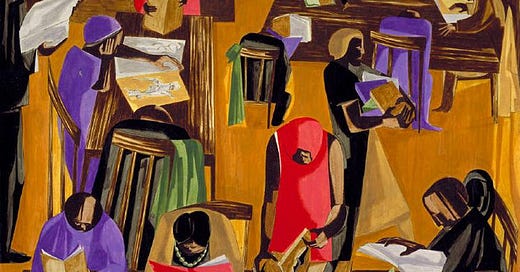As I’ve tucked my sixth year of library service under my belt (which is just fraction of the long, committed years many of my colleagues have put in), I still find myself perpetually awed by this necessary institution. Libraries are a space of resistance — currently, we find ourselves resisting the myth that this institution is obsolete, culture-wars that have set their sights on censorship, and against the downstream tides of socioeconomic injustice and illiteracy.
I could get nice and comfortable on a pro-library soapbox, but I’ll spare you that for now. Today, I’d like to offer you a handful of reasons why you should actively care about and support your local libraries.
It is one of the few remaining “third places".
“Third place” is a term used to describe an space that is alternate from your home or workplace. Specifically, a space where an individual can thrive and find comfort through community, conversation, and commonality. As modern civilization drifts further towards the pull of “remoteness,” these places have become less common — particularly for the underprivileged.
Public libraries are vibrant and stable third places. At the branch I work at, we have regulars that live the majority of their days inside our walls. The library not only functions as mere shelter, but as an ecosystem of enrichment.
We are desperately in need of common ground.
Wherever and however you find yourself, the library can be of service to you. It is, ideally, a space welcoming to those of all backgrounds, abilities, and statuses — even better, it is a gathering place of this assortment for its particular community. A space like this is not only unique in our day and age, but undeniably necessary for our collective well-being. We must not grow calloused to this being with one another, however unusual it may feel.
It reconnects us to our local, embodied communities.
This point warrants a whole other article, but put simply: those of us who have the means have grown used to living a spatially disintegrated lifestyle. We drive significant distances to frequent loved ones’ homes, school, work, church — all of our daily comings-and-goings. Not everyone has access to this, which finds them entirely reliant and connected to that which is near.
While therein lies a whole other slew of injustices in regards to this discrepancy, it is worth noting that we are meant to live locally. Tending to our immediate spaces is the easiest way towards human flourishing, and it is when we disintegrate from this that isolation and oppression ensues.
Access to books leads to literacy, literacy leads to critical thinking, critical thinking leads to a well-rounded, reasonable society.
I’m not going to beat the dead horse about how social media is corrupting us to become a more brazen, illiterate, polarized, and angry society. You see it, you experience it. It’s a nightmare that I believe that majority of us want to escape. Wouldn’t it behoove us to uphold one of the few remaining institutions that might equip us towards this end?
You might not necessarily need the resources and services offered by the library, but someone else might.
Whether or not you find yourself in a position of lack, there are still a multitude of ways the library can enhance your daily life. By supporting libraries through your patronage of them, you ensure that this essential space is maintained and bolstered for everyone in your surrounding communities.
We have an obligation to support libraries. To use libraries, to encourage others to use libraries, to protest the closure of libraries. If you do not value libraries then you do not value information or culture or wisdom. You are silencing the voices of the past and you are damaging the future.
— Neil Gaiman2
The main way you can participate in National Library Week is by visiting your local library — sign up for a card, check out some items, talk to a librarian about the unique services have a home right in your community.
Sourced from the American Library Association:
“National Library Week is an annual celebration highlighting the valuable role libraries, librarians, and library workers play in transforming lives and strengthening our communities.
In the mid-1950s, research showed that Americans were spending less on books and more on radios, televisions and musical instruments. Concerned that Americans were reading less, the ALA and the American Book Publishers formed a nonprofit citizens organization called the National Book Committee in 1954. The committee's goals were ambitious. They ranged from "encouraging people to read in their increasing leisure time" to "improving incomes and health" and "developing strong and happy family life."
In 1957, the committee developed a plan for National Library Week based on the idea that once people were motivated to read, they would support and use libraries. With the cooperation of ALA and with help from the Advertising Council, the first National Library Week was observed in 1958 with the theme "Wake Up and Read!" The 2023 celebration marks the 65th anniversary of the first event.
I love this lecture by Gaiman on the importance of libraries. You can read the transcript here.






Gosh David Pearlmutter, thanks for the great tip and Caroline, wow, this is a splendid reminder. Thank you for capturing this. To me Librarians are such incredible resources and guides. I love the idea of local libraries as "3rd places." I think that's spot on. I have the benefit of living in a generous community that's continued supporting library funding.
Thank you for your perspective! I love the point you made about libraries being a place for finding common ground. It’s so important these spaces exist as our society becomes more and more polarized.